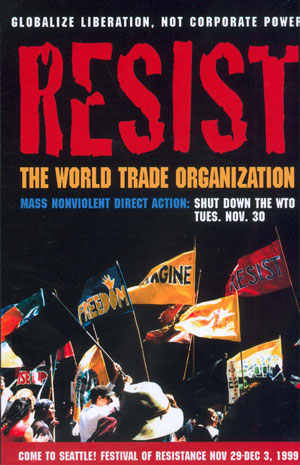talking history | syllabi | students | teachers | puzzle | about us
WTO History Project
http://depts.washington.edu/wtohist/
Created and maintained by Margaret Levi and the WTO History Project team, with assistance from the Manuscripts, Special Collections, and University Archives Division of the University of Washington Libraries.
Reviewed Aug.-Nov. 2012.
The WTO History Project (WTOHP) archives several important resources related to the World Trade Organization (WTO) protests in Seattle between November 19 and December 2, 1999. The third ministerial of the WTO was derailed by thousands of protesters who closed down the city center and blocked access to the Seattle Convention Center and nearby venues where the ministerial meetings were scheduled to occur. “The battle in Seattle” brought together activists and their organizations for street marches, blockades, teach-ins, and rallies. Activists represented many causes, including human rights, the environment, labor, peace and justice, and anticapitalism. In response to the protests police used less lethal weapons (for example, tear gas and rubber bullets) and mass arrest; the mayor established a curfew and a no-protest zone; and the governor called out the National Guard. Scholars credit the protests as the genesis of the U.S. global-justice movement.

Resist the World Trade Organization [recto]
The WTOHP Web site provides excellent primary data for academics and students alike. The site is divided into three central data source tabs: “The Protests,” "Interviews,“ and ”Resources." The protest materials include two downloadable spreadsheets. One lists the more than five hundred events that occurred in the months leading up to the wto ministerial and during the week of the ministerial. The spreadsheet includes data on the day, title, sponsor, location, and description of each event, and the unique identification number of the University of Washington Libraries Special Collections (UWLSC) archive box where a hard copy of each document used to code the event is stored. The other spreadsheet draws from a list of over 1,400 nongovernmental organizations (NGOs) that signed a letter opposing the WTO’s policies. Data includes demographic and contact information for organizations that signed the letter. The source is useful for researchers who want to conduct event history analyses or who seek a sampling frame for conducting subsequent organizational research.
The site also provides access to fifty interviews with activists from groups involved in mobilizing the protests. They provide rich, descriptive accounts of how the protests were mobilized, who the key actors were, and what issues brought them together.
Most useful of the resources is the digital collection of artifacts stored on the special collections server. Artifacts include written documents (for example, NGO newsletters and position papers challenging WTO policies, press releases, and correspondences between organizers) and photos of police and protesters, costumes, banners, and other artwork.
The UWLSC Digital Library has recently updated the search engine, allowing guests to utilize standard search commands or to browse the entire online collection. The browse function allows researchers to see thumbnails of the digital content in a way similar to looking through an archive box. It is more efficient than physically rummaging through a box, however, since researchers are able to browse many boxes at once, pulling up the desired content based on object type (for example, flyers, interviews, and photographs), organizational affiliation materials (such as Direct Action Network press releases), and subject using an A–Z index.
The WTO History Project is the best primary-data resource available for the protest events in Seattle in the fall of 1999.
Patrick F. Gillham
University of Idaho
Moscow, Idaho
